Quick Thoughts on Genesis 1 (& the Best Visual Interpretation I've Seen)
How things begin matters. We see God‘s intention for creation from the beginning: an integrated whole, in which all the parts are good and all the parts fit together to give glory to God. The Hebrew word for this is?shalom: peace, wholeness, harmony.![I love this visual interpretation of Genesis 1 [www.minimumbible.com]](http://static1.squarespace.com/static/5d70f59aefca59000162e4e6/5d7fcef39f682762992c8aca/5d7fceff9f682762992c8c25/1568657151354/6837951_1615284_lz.jpg?format=original)
The Song of Creation
One other quick thought on Genesis 1. The author talks of days and nights from the very beginning, but the sun and the moon aren‘t created until the fourth day. Ancient peoples were more connected to sun and moon than we are, now that we have electricity and night doesn‘t mean dark. Ancient peoples certainly knew that the sun and the moon are required for there to be days? and nights.Here‘s the point: Genesis 1 is a beautiful theological treatise on creation, and for me, I don‘t see it contradicting physics and cosmology; I see physics and cosmology providing the fine details and Genesis 1 the broad strokes.
P.S. The Best Visual Interpretation of the Bible I've Ever Seen
I've written previously about Darren Aronofsky's?Noah?and shared some of my reservations about the final 15 disappointing minutes of the movie. But this scene in which Noah retells the Genesis story of Creation and Fall is the best visual interpretation of scripture I've ever seen (although the image from The Minimum Bible project I included above is pretty good, too):[embed]https://www.youtube.com/watch?v=FFCXHr8aKDk[/embed]
P.P.S. Join Us!
Folks in my church are reading through Genesis as part of our 2015 Bible?reading plan. We'd love to have you join us and make it a part of your #First15.
A Christmas Hymn
A poem for you and yours. Merry Christmas.!["Census at Bethlehem," by Pieter Bruegel [1566]](http://static1.squarespace.com/static/5d70f59aefca59000162e4e6/5d7fcef39f682762992c8aca/5d7fcefe9f682762992c8c1c/1568657150715/census-at-bethlehem-1566.jpg?format=original)
A Christmas Hymn
by Richard Wilbur A stable-lamp is lightedWhose glow shall wake the sky;The stars shall bend their voices,And every stone shall cry.And every stone shall cry,And straw like gold shall shine;A barn shall harbor heaven,A stall become a shrine. This child through David‘s cityShall ride in triumph by;The palm shall strew its branches,And every stone shall cry.And every stone shall cry,Though heavy, dull, and dumb,And lie within the roadwayTo pave his kingdom come. Yet he shall be forsaken,And yielded up to die;The sky shall groan and darken,And every stone shall cry.And every stone shall cryFor stony hearts of men:God‘s blood upon the spearhead,God‘s love refused again. But now, as at the ending,The low is lifted high;The stars shall bend their voices,And every stone shall cry.And every stone shall cryIn praises of the childBy whose descent among usThe worlds are reconciled.
Quiz! What's Your Favorite Idol?
Are we modern, Western people really more advanced than the ancients? We certainly believe we are. This arrogance is one of the reasons modern Americans have such difficulty with the Bible; after all, we are advanced and advancing, and the Bible--particularly the Old Testament--is backwards and primitive.It is true that we are an advanced people technologically--think of all the ways we can kill or display pornography!--but when it comes to idolatry, we are as prone to idol worship as the ancients. Or more so.
Israel and the Golden Calf
We read in Exodus 32 of the golden calf that the Israelites made and worshipped while waiting for Moses to return from Mount Sinai. Like so many of the stories in the Bible,‘the account of the golden calf seems remote and distant. But that's because we don't understand what an idol is.
The Definition of an Idol
In his book Counterfeit Gods,?Tim Keller describes idolatry in this way:
What is an idol? It is anything more important to you than God, anything that absorbs your heart and imagination more than God, anything you seek to give you what only God can give.A counterfeit god is anything so central and essential to your life that, should you lose it, your life would feel hardly worth living. An idol has such controlling position in your heart that you can spend most of your passion and energy, your emotional and financial resources, on it without a second thought. It can be family and children, or career and making money, or achievement and critical acclaim, or saving 'face' and social standing It can be a romantic relationship, peer approval, competence and skill, secure and comfortable circumstances, your beauty or your brains, a great political or social cause, your morality and virtue, or even success in the Christian ministry. When your meaning in life is to fix someone else's life, we may call it 'co-dependency' but it is really idolatry. An idol is whatever you look at and say, in your heart of hearts, 'If I have that, then I'll feel my life has meaning, then I'll know I have value, then I'll feel significant and secure.' There are many ways to describe that kind of relationship to something, but perhaps the best one is worship." [Emphasis mine.]
Be Proud, O Modern
Idolatry isn't something that we've grown out of; idolatry is something modern Western culture is perfecting. The ancients would be astounded at the brazen boldness of our idolatry: we are worshipping idols of which they never dreamed.
Which Idol Did You Get?
J.A. Medders has a nice summary of Keller's material on his blog, which I've excepted below.
Life Only Has Meaning/I Only Have Worth If....
- I have power and influence over others. (Power Idolatry)
- I am loved and respected by _____. (Approval Idolatry)
- I have this kind of pleasure experience, a particular quality of life. (Comfort idolatry)
- I am able to get mastery over my life in the area of _____. (Control idolatry)
- People are dependent on me and need me. (Helping Idolatry)
- Someone is there to protect me and keep me safe. (Dependence idolatry)
- I am completely free from obligations or responsibilities to take care of someone. (Independence idolatry)
- I am highly productive and getting a lot done. (Work idolatry)
- I am being recognized for my accomplishments, and I am excelling in my work. (Achievement idolatry)
- I have a certain level of wealth, financial freedom, and very nice possessions. (Materialism idolatry)
- I am adhering to my religion‘s moral codes and accomplished in its activities. (Religion idolatry)
- This one person is in my life and happy to be there, and/or happy with me. (Individual person idolatry)
- I feel I am totally independent of organized religion and am living by a self-made morality. (Irreligion idolatry)
- My race and culture is ascendant and recognized as superior. (Racial/cultural idolatry)
- A particular social grouping or professional grouping or other group lets me in. (Inner ring idolatry)
- My children and/or my parents are happy and happy with me. (Family idolatry)
- Mr. or Ms. Right? is in love with me. (Relationship Idolatry)
- I am hurting, in a problem; only then do I feel worthy of love or able to deal with guilt. (Suffering idolatry)
- My political or social cause is making progress and ascending in influence or power. (Ideology idolatry)
- I have a particular kind of look or body image. (Image idolatry)
The Only Known Cure
The only known cure for idolatry: faith, hope, and love.
Some New Music for You to Check Out
How could you not take to a guy like this? Meet David Crowder, in his own words:
I was born half Baptist (the East Texas, King James carrying, pipe organ, hymnal singing, Southern, type Baptist) and half Pentecostal (the Holy Ghost, jumpin? and shoutin?, hand-waving, prophecying, Southern, type Pentecostal). Later, I was born again.
Crowder Math
I've been a fan of David Crowder's music for over a decade; nobody sounds like him. Here's my summary of his unique style:Texas gospel rockabilly+Electronic dance beats+simple, piercing lyrics
= David Crowder
Hee Haw, Aqua Net, and Olivia Newton John
[embed]http://www.youtube.com/watch?v=AUwXo0jgORI[/embed]David on his musical influences:
The son of an insurance salesman and a social worker, fructifying in the piney woods of Texarkana, I was as muddled as the name of my town. We drove a light blue Ford Thunderbird; not the old, classic kind, but a brand new one that had a sticker on it. The one with the electric windows and mirrors and the headlamp covers that flipped open when you turned on the headlights and an in-dash eight-track player. My dad and mom both used Aqua Net hair spray. He parted it on the right side and always carried a comb. She got permanents and had curlers that heated up every Saturday night while we all watched The Lawrence Welk Show and Hee-Haw. The eight-tracks in rotation were Elvis, Willie Nelson, Olivia Newton John, and Bill Gaither. Everything I‘ve ever done musically can be traced back to there that Ford Thunderbird, those sounds, the view out of those windows, and my brother punching me in the arm on the way to Sunday morning Church. That is all metaphor and all true.
After 6 albums, the David Crowder* Band broke up in 2012. But, David has kept making music under the name Crowder? and released his first solo album, Neon Steeple, in May 2014.
Neon Steeple
Like previous David Crowder albums,?Neon Steeple has a story to tell from start to finish. Although there are a few standout songs that work well on their own, the best way to listen to the album is in one sitting, beginning to end.Here's David describing his work on the album:
Neon Steeple is a collection of songs and sounds looking forward to the past and counting the present as sacred. It is a longing for belonging, a search for home. It is a collection of choruses that believe that this is not all there is. There is more, there must be. It is the sound of the Appalachians and Ibiza. Folk music and EDM. The music of the People. Folktronica. Digital and Analog. The Ones and Zeros and the Handshake. The Banjo and the 808.
Four Year-Old Dance Party, etc.
Neon Steeple is a beautiful album that tells a beautiful story in an unsentimental and creative way. It's also a lot of fun.The song My Beloved? is a favorite of a four year-old in my household. (The video is embedded above, but the album track is a much better version.) It‘s a clap-your-hands-stomp-your-feet happy hoedown.One of my favorite tracks is Come As You Are? (embedded below) that is an invitation to the weak, weary, broken-down to lay down their burdens and shame.[embed]http://www.youtube.com/watch?v=PE6QXWFL6jY[/embed]Another standout track is the southern throw-down Lift Your Head Weary Sinner (Chains). It‘s an aggressive, growling song.But to pick out those three tracks is to give the impression that the rest aren‘t worth hearing, an impression I don‘t want to give.?I Am? is another favorite of mine; I love the ambiguity in the central hook:
"I am holding onto you;In the middle of the storm,I am holding on...I am."
Who's holding whom? That's the question, isn't it?Another great track is the duet with Emmylou Harris (?My Sweet Lord?): just achingly beautiful.
?Blind is the fool, I see that now;I broke the rules, and let ya down.I walked alone; now I have run dry:I need my sweet Lord to help tonight.
The entire album is really strong: I recommend it.
"Making Dead People Alive"
As much as I appreciate David Crowder the musician, I think I appreciate David Crowder the writer and theologian even more:
Neon Steeple is both a critique and a hope. The meta-narrative of scripture is about innocence lost, it is about displacement, about things not being right and a search for belonging and home and forgiveness and reconciliation, the tension of death and life, what it means to be alive. The story is not about making bad people good, it is about making dead people alive. The story sold is rarely that.What if we started believing??
What if indeed?
Is God Nice?
The conventional?wisdom is that God?is just like a religious Santa Claus: nice, gentle, and tame. In other words, a God totally unknown to the Israelites.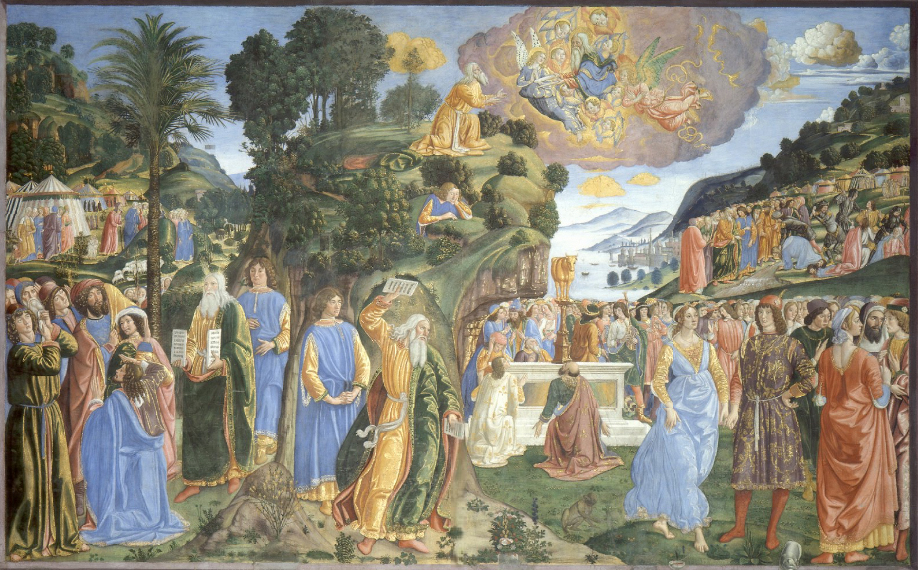
The Israelites Were Afraid at Sinai
In Exodus 19 we read of the intense preparations the Israelites take before the theophany on Mt. Sinai. This is the first contact the ordinary Israelites have ever had with the Lord, and they are terrified.
And So Is Everyone Else
Terror is actually the universal sentiment in scripture when ever anyone meets with God or his angels. Even in the New Testament, the human response to a theophany (a divine appearance) is always fear:
- Remember the shepherds in Luke's account of Christmas, keeping watch over their flocks by night? The first thing the angel of the Lord says to them is "Fear not!" [Luke 2:10].
- On the Mount of Transfiguration, even Peter is terrified at the temporary vision he, James, and John are given of the true nature of Jesus. When they hear the voice of God, they fall to the ground in terror [Matthew 17:6].
- On the road to Damascus, Paul also falls to the ground in fear after hearing the voice of the risen Christ [Acts 9:4].
Scripture is clear: the majesty of God is terrible to behold.
Her Majesty is Not Amused
![[Credit: thestar.com]](http://static1.squarespace.com/static/5d70f59aefca59000162e4e6/5d7fcef39f682762992c8aca/5d7fcefb9f682762992c8bda/1568657147737/queen_elizabeth.jpg?format=original) We should not be surprised that divine majesty is as serious as something can be. Even 21st century interactions with human majesty require clear protocol and produce respect and solemnity. Consider the rules‘that even the American President has to observe when he meets with Her Majesty. For example, it is considered reprehensible to ever turn your back on the queen. Why? Because majesty provokes respect.
We should not be surprised that divine majesty is as serious as something can be. Even 21st century interactions with human majesty require clear protocol and produce respect and solemnity. Consider the rules‘that even the American President has to observe when he meets with Her Majesty. For example, it is considered reprehensible to ever turn your back on the queen. Why? Because majesty provokes respect.
"All Rise"
![The Supreme Court of the United States of America [credit: Wikipedia]](http://static1.squarespace.com/static/5d70f59aefca59000162e4e6/5d7fcef39f682762992c8aca/5d7fcefb9f682762992c8bdd/1568657147953/20120110094716SCOTUSbuilding_1st_Street_SE.jpg?format=original) We don't have a king or queen in this country, but we do have the law, and the law is majestic and terrible. The law has the power of life and death over the people. When the judge enters the courtroom, everyone stands out of respect, not of the person of the judge, but of the law which the judge represents. Only God is greater than the law.
We don't have a king or queen in this country, but we do have the law, and the law is majestic and terrible. The law has the power of life and death over the people. When the judge enters the courtroom, everyone stands out of respect, not of the person of the judge, but of the law which the judge represents. Only God is greater than the law.
God is Not Tame
It shouldn't be surprising that a divine appearance is terrible. Moses was right to prepare the people. Any God worth the title is by definition greater than anyone of whom we can conceive. Our pop culture versions of the Santa Claus God betray our lack of honest imagination.To paraphrase C.S. Lewis, God is good, but he is not tame.No, it's not surprising that God is terrible and majestic. But do you know what is surprising?![[Credit: endhairloss.eu. (I know--weird place for a baby pic.)]](http://static1.squarespace.com/static/5d70f59aefca59000162e4e6/5d7fcef39f682762992c8aca/5d7fcefc9f682762992c8be0/1568657148162/Reasons-for-hair-loss-in-newborn-babies.jpg?format=original) That the Word became flesh and dwelt among us, and we have seen his glory, the glory of the One and Only, full of grace and truth [John 1:14].The Incarnation? That's surprising in the best possible way.
That the Word became flesh and dwelt among us, and we have seen his glory, the glory of the One and Only, full of grace and truth [John 1:14].The Incarnation? That's surprising in the best possible way.
What I Did on My Summer Vacation (And You Can, Too!) [#EatThisBook - Exodus 12-13]
Even though I only work one (half) day a week, it's still good for me to get away on vacation from time to time. My family was blessed to do a fair among of traveling this summer, including a European Grand Tour. In the last few months we've been through several European countries and a few different states, but wherever we went, we made sure to do one thing, no matter what. The one thing we did is easy for you to do, too, dear reader, and the best part is, you have my money-back guarantee? that this one thing will change your life.... We went to church.I know it sounds crazy, but it's really true: we actually went to church?while we were on vacation!This summer we visited:
We went to church.I know it sounds crazy, but it's really true: we actually went to church?while we were on vacation!This summer we visited:
- a charismatic non-denominational church in Oxford, England;
- an African Methodist church in Munich, Germany;
- a Roman Catholic mass--in Flemish!--in the beautiful Church of Our Lady in Bruges, Belgium (I was lost during the sermon but was able to follow the communion liturgy pretty well);
- an American Baptist church on Cape Cod, MA;
- and a small Methodist church in my wife's small Virginia hometown.
The experiences I had while worshipping in other churches are among my favorite memories from what was a great summer.
Moses Creates a New Holiday
In my church, we are in the midst of a 90 scripture reading campaign called Eat This Book. We're currently reading through the book of Exodus, and today read the passage in which Passover is instituted as an annual ritual of remembrance for the Israelites. (I'm supposedly blogging each day about that day's assigned chapter, but today's post is a combined post of Exodus 12 and 13.)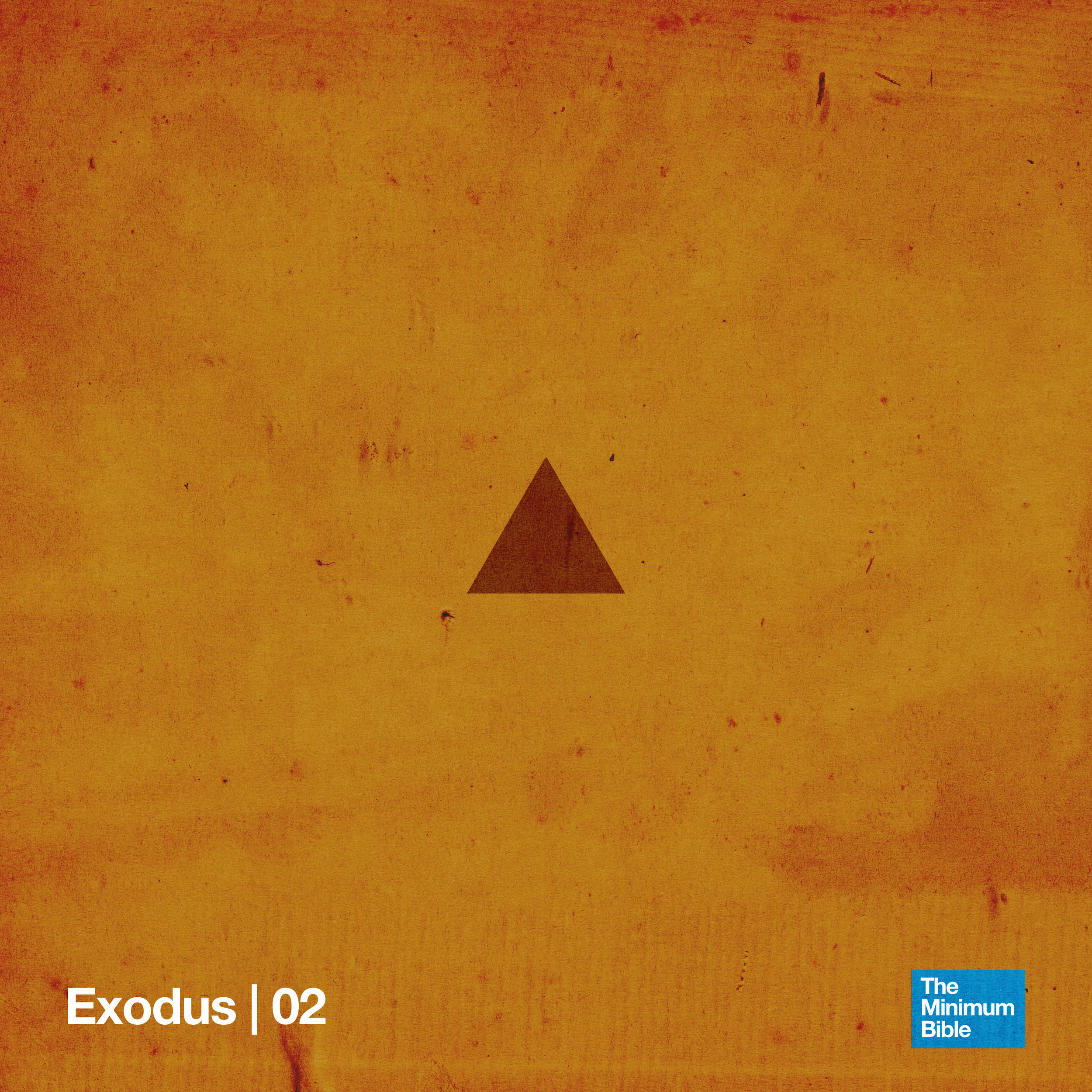 One idea struck me in the instructions Moses gives the people regarding the Passover: the Passover is to help the Israelites?remember.
One idea struck me in the instructions Moses gives the people regarding the Passover: the Passover is to help the Israelites?remember.
24You shall observe this rite as a perpetual ordinance for you and your children.25When you come to the land that the?Lord?will give you, as he has promised, you shall keep this observance.26And when your children ask you, What do you mean by this observance???27you shall say, It is the passover sacrifice to the?Lord, for he passed over the houses of the Israelites in Egypt, when he struck down the Egyptians but spared our houses.?? And the people bowed down and worshipped.... (Exodus 12:24-17)8You shall tell your child on that day, It is because of what the?Lord?did for me when I came out of Egypt.?9It shall serve for you as a sign on your hand and as a reminder on your forehead, so that the teaching of the?Lord?may be on your lips; for with a strong hand the?Lord?brought you out of Egypt.... (Exodus 13:8-9)14When in the future your child asks you, What does this mean?? you shall answer, By strength of hand the?Lord?brought us out of Egypt, from the house of slavery.15When Pharaoh stubbornly refused to let us go, theLord?killed all the firstborn in the land of Egypt, from human firstborn to the firstborn of animals. Therefore I sacrifice to the?Lord?every male that first opens the womb, but every firstborn of my sons I redeem.?16It shall serve as a sign on your hand and as an emblem?on your forehead that by strength of hand the?Lord?brought us out of Egypt." (Exodus 13:14-16)
The Passover is to be observed yearly, so that every generation will learn and remember that the children of Israel were slaves in Egypt, but the Lord brought them out with a mighty hand and an outstretched arm. They are to remember who they are and whose they are.
Some Things Don't Change
If you know anything about the Old Testament, you'll know that the Israelites are in constant danger of forgetting their unique heritage and instead returning to the slavery of false gods.I'm not an ancient Israelite, but I am just as prone to forgetting my identity as they were, perhaps more so. Our culture is a culture obsessed with getting and spending, and it's a culture that is doing everything possible to make me believe that I am nothing but a consumer. Worship, then, becomes a way of remembering that we are more than just consumers. I appreciate how Walter Brueggemann puts it:
The biblical community of faith is a community of memory, working at its precious identity in a culture devoted to amnesia. The market forces that encourage a consumer consciousness are largely controlled by ideology that wants to abandon the past and forsake the future in order to live in the absolute "now." Those who neither remember nor hope are profoundly vulnerable to consumerism, busy filling the void left be eradication of that extra dimension of historical awareness that belongs to healthy humanness. Thus when the community says, "This do in remembrance," it is not engaged in a mere history lesson or a simple act of piety. It is, rather, engaged in an act of resistance against an ideology that will destroy any Passover-driven humanness."
Weekly worship is a necessary reminder that you and are I not merely consumers. More than that, weekly worship reminds us, that contrary to how things often seem, God is in control and fear is always a lie. Those are messages I need to hear at least once a week.So, you need to be in church every week. Otherwise, how will you remember the truth?
Three Things I Remember Every Time I Go to Church
The following lessons are available to me every week in my home church, but for some reason they were made more clear to me as my family visited other churches this summer, thousands of miles away.When I go to church:
- I remember that it's not about me. Most of my life I think mostly about me. (May God heal me from self-obsession.) But on Sunday morning, in church, I'm reminded otherwise as I sing, pray, and think about the Lord. I'm not at the center of reality. It's good to remember that.
- I remember that I'm not the only one. When I worship with other Christians with whom I have nothing in common except faith in the Lord, I am always encouraged: there are people all over the world, in all kinds of languages, who are walking this journey with me.
- I remember that Christ is risen from the grave. It's been a summer of evil headlines, and it's easy to lose hope and become world-weary. But on Sundays I'm reminded that the same Lord who heard the cry of the Israelites and brought them out of slavery in Egypt is the same Lord who was crucified and raised from the dead and the same Lord who promises that he has overcome the world and that ultimately we have nothing to fear.
So, that's what I did on vacation this summer: I went to church. (At least on Sundays, not the other days of the week. I mean, I'm not?religious about it.)You should try it. It will change your life. I guarantee it?.
The Only Time I'll Ever Write About Ann Coulter
Ann?Coulter makes her living as a media personality by writing and saying provocative things. To cite a recent example, her August 6 post about Dr. Kent Brantly, the American medical missionary who contracted Ebola in Liberia after caring for infected Africans, is?entitled "Ebola Doc's Condition Downgraded to 'Idiotic'." I generally decline to be baited by provocateurs (pearls before swine?and all that) and I certainly have no wish to add to Ms. Coulter's lucrative notoriety. But this time, I can't help myself.I can't help commenting on Ms. Coulter's post because over at First Things?I read an excellent response to it that I want everyone I know to read. I can't resist sharing the First Things post?not because of what the author, Collin Garbarino, says in response to Ann Coulter, but because of what he says about the gospel and about how God works in the world.Ms. Coulter calls Dr. Brantly's actions "idiotic," but Mr. Garbarino reminds us that God's wisdom often looks foolish to the so-called wise of the world:
Christianity has always been a little topsy-turvy. The mightiest king in the universe was born in a lowly stable. The second person of the Godhead??emptied himself, by taking the form of a servant.??He had no form or majesty that we should look at him, and no beauty that we should desire him.?He had??no place to lay his head,? and he surrounded himself with a rag-tag group of fishermen and tax collectors. Jesus could stand as a righteous judge, but he allowed himself to die a sinner‘s death. Through sacrifice?God saved his people.Through death death is conquered. What‘s more foolish than dying in order to live? Christ calls his people to do just that. Take up your cross and follow him." [Emphasis mine.]
Mr. Garbarino goes on to take exception to Ann Coulter's suggestion that Dr. Brantly would have been better off converting a "Hollywood power-broker" than serving Africans without influence, correctly pointing out that worldly influence and power are not God's preferred way of changing the world:
God uses weakness in order to show his own power, and in spite of his habit of using the lowly, he‘s still managed to turn the world upside down. When people start thinking that they need the clout of a??Hollywood power-broker? to do God‘s work, they‘ve abandoned the gospel. If we attempt to convert the mighty so that we can use their resources, we're telling the world that God‘s power is insufficient. Does God need the rich and powerful to change the world? May it never be. God is sufficient in himself to do all he sets out to do." [Emphasis mine.]
The whole post is an excellent summary of the Church's claims about Jesus and worth the 5 minutes to read it. Read the whole thing here.For some reason, we live in a world in which people without wisdom--celebrities, media personalities, and Hollywood power-brokers--are often seen as wise. In such a world, I prefer the foolishness of God and the examples of idiots like Dr. Brantly.
1. As is obvious, I am not in agreement with Ann Coulter on this issue. In fairness, however, she does raise some important points in her post. For example, it is true that the American church should be doing more to care for the poor in our own country. But, loving our neighbors is not an either/or issue. According to Jesus, the Liberian with Ebola is just as much my neighbor as is the homeless man down the street: I have a responsibility to show mercy to them both.2. I was encouraged to see Dr. Russell Moore of the Southern Baptist Convention remind his readers that Christians ought to exercise more discernment before sitting at the feet of "hucksters and demagogues."
In Which I Compare Myself to Barack Obama
Have you ever known things about people that you had to keep to yourself?On Sunday afternoon, May 1, 2011, President Obama and the rest of the National Security Council gathered in the White House Situation Room to watch the final tense minutes of the Bin Laden raid. As Pete Souza's famous photo conveys, those were minutes of high drama, quite different from the President's surroundings of the previous evening. Less than 24 hours earlier on that previous Saturday evening, April 30, President Obama was watching an event with much less significance than the Bin Laden raid: the White House Correspondents Dinner. During the course of the evening, host and comedian Seth Meyers made a Bin Laden joke and President Obama smiled politely, all the while knowing that the Navy SEALs were already on their way to Abbatabad. The contrast is striking:‘the President surrounded by frivolity while events of life-and-death importance unfold. And he can't tell anyone....
Less than 24 hours earlier on that previous Saturday evening, April 30, President Obama was watching an event with much less significance than the Bin Laden raid: the White House Correspondents Dinner. During the course of the evening, host and comedian Seth Meyers made a Bin Laden joke and President Obama smiled politely, all the while knowing that the Navy SEALs were already on their way to Abbatabad. The contrast is striking:‘the President surrounded by frivolity while events of life-and-death importance unfold. And he can't tell anyone....
I Know Things About People
I know what it's like to have to keep things close. As a pastor, people tell me their stories, and so I know things about people that they normally keep private. I'm often struck, at the end of a day, at how much suffering so many people carry around with them. And the striking thing about their sufferings is that they are often carried in secret: life carries on all about them in its ordinary way.
"About Suffering They Were Never Wrong"
The great 16th century Flemish painter Pieter Bruegel the Elder was aware of the strange juxtaposition of how everyday life and life-altering suffering might often rub shoulders throughout the course of any given day. In fact, this juxtaposition is a part of two of his most famous paintings. I referenced this 1566 Bruegel painting--Census at Bethlehem--in my 2010 Christmas Eve sermon. It's an ordinary Flemish town on an ordinary winter day, but the title of the painting hints at something more, and when you look more closely, you see, in the bottom right corner, a hunched-over man leading a woman on a donkey. You think for a bit, and then you understand: it's Joseph leading Mary, in the pain of the last moments of pregnancy, hoping to find room in the inn.
I referenced this 1566 Bruegel painting--Census at Bethlehem--in my 2010 Christmas Eve sermon. It's an ordinary Flemish town on an ordinary winter day, but the title of the painting hints at something more, and when you look more closely, you see, in the bottom right corner, a hunched-over man leading a woman on a donkey. You think for a bit, and then you understand: it's Joseph leading Mary, in the pain of the last moments of pregnancy, hoping to find room in the inn.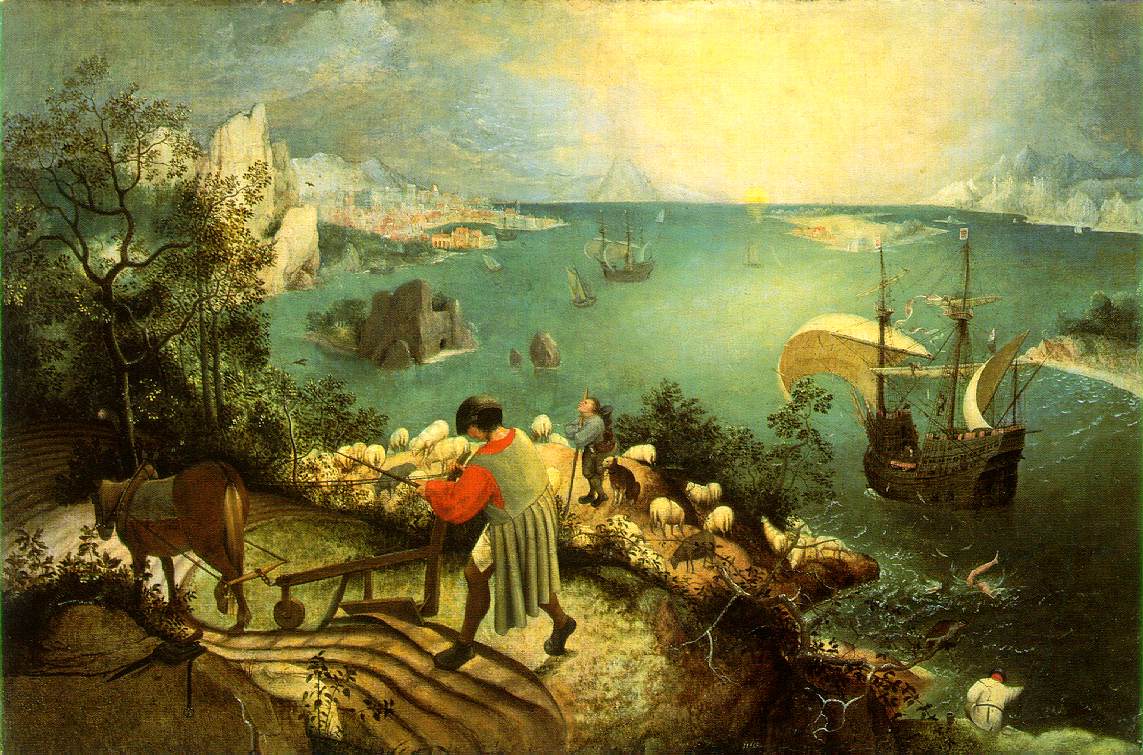 Bruegel probably painted the above landscape scene in the 1560s, and like Census at Bethlehem?it seems at first to be an ordinary scene from Flemish life. But with the help of the title--Landscape with the Fall of Icarus--you look more closely and notice two white legs sticking up out of the water in the bottom right of the painting. Icarus, of course, is the boy from the Greek myth who flew too closely to the sun and fell from the sky as a result.So, in the one painting, ordinary market day life goes on while the most important birth in history is about to take place in the most humiliating and filthy of circumstances; in the other, the plowman is pushing furrow after furrow while Daedalus's son falls out of the sky. What is Bruegel trying to tell us?
Bruegel probably painted the above landscape scene in the 1560s, and like Census at Bethlehem?it seems at first to be an ordinary scene from Flemish life. But with the help of the title--Landscape with the Fall of Icarus--you look more closely and notice two white legs sticking up out of the water in the bottom right of the painting. Icarus, of course, is the boy from the Greek myth who flew too closely to the sun and fell from the sky as a result.So, in the one painting, ordinary market day life goes on while the most important birth in history is about to take place in the most humiliating and filthy of circumstances; in the other, the plowman is pushing furrow after furrow while Daedalus's son falls out of the sky. What is Bruegel trying to tell us?
Mus?e des Beaux Arts
The Anglo-American poet W.H. Auden saw both of those paintings in 1938 while visiting the Royal Museums of Fine Arts in Brussels, Belgium, and he was moved to write the following famous poem about his insight into the paintings:
About suffering they were never wrong, The Old Masters:How well they understood its human position;How it takes place while someone else is eatingOr opening a window or just walking dully along;How, when the aged are reverently,Passionately waiting for the miraculous birth,There always must be childrenWho did not specially want it to happen,Skating on a pond at the edge of the wood:They never forgot that even the dreadful martyrdomMust run its course anyhow in a corner,Some untidy spotWhere the dogs go on with their doggy lifeAnd the torturer's horse scratches its innocent behind on a tree.In Breughel's Icarus, for instance:How everything turns away quite leisurely from the disaster;The ploughman may have heard the splash,The forsaken cry,But for him it was not an important failure;The sun shone as it had to on the white legsDisappearing into the green water;And the expensive delicate shipThat must have seen something amazing,A boy failing out of the sky,Had somewhere to get to and sailed calmly on.Mus?e des Beaux Arts (1939)
Auden's poem elaborates Bruegel's point: suffering goes on?right in the midst of ordinary life.
- One mother addresses envelopes for her six year-old son's birthday party, while another holds her son's hand as he receives his weekly chemotherapy treatments;
- One hotel room hosts a man whose wife has just left him, while another contains a pair of giddy newlyweds;
- One man picks up his coffee from the coffee shop, his only small pleasure in a day of misery, while another pays for his cup while on his way to his much-anticipated yearly hunting trip with his adult son.
As Bruegel and Auden remind us, suffering is not separated from ordinary life; rather, it's woven into it. All around us are people carrying what would seem to be unbearable burdens, people in the midst of intractable problems, while the rest of us go about daily life. I know this is true, because I hear people's stories.
Strawberries, Small Talk, and Suffering
A few weeks ago, my wife and I had planned to have my staff over to our house for lunch. Right beforehand I had heard sickening news about someone I care about, and that news was heavy on my mind. But, the news was confidential, and we were expecting lunch guests, so I tried to push it aside and jovially welcome our guests. It was a surreal contrast: curry chicken lettuce wraps and summer strawberries and small talk, while I kept thinking about the suffering person I'd just heard about not sixty minutes before.But that's life, isn't it? I hear more about other people's sufferings than the average person, perhaps, but you know about sufferings too, either your own or others, and you also know that life goes on. Bruegel was right: the greatest sufferings happen right alongside the greatest trivialities.
The Power of a Simple Courtesy
People all around us are carrying heavy burdens, and most of the time, you can't tell by looking at them. This fact makes me regret all the times I failed to show courtesy to strangers, or took unnecessary offense or became annoyed at the behavior of another person. Who knows with which secret difficulties they were ensnarled?Here's what I do know: in a world in which so many people are carrying secret sufferings, small, simple courtesies can mean the world.
My One Major Problem With the "Noah" Movie
 I loved the first 2 hours of Darren Aronofsky's?Noah. I have no problem with the creative liberties Mr. Aronofsky takes with the source material--in fact I loved his creativity. Below, I'll tell you what I appreciated. But first....Here's My Problem With?Noah?(no spoilers here):In a masterful way, the film's message couldn't be more?clear, true, or terrifying: humans are a violent, selfish, sinful race, and there is no hope for us. We cannot save ourselves.And then the final 18 minutes makes this point: "After the Flood, the good news is that humanity--led by Noah--now gets to save itself."See the problem?
I loved the first 2 hours of Darren Aronofsky's?Noah. I have no problem with the creative liberties Mr. Aronofsky takes with the source material--in fact I loved his creativity. Below, I'll tell you what I appreciated. But first....Here's My Problem With?Noah?(no spoilers here):In a masterful way, the film's message couldn't be more?clear, true, or terrifying: humans are a violent, selfish, sinful race, and there is no hope for us. We cannot save ourselves.And then the final 18 minutes makes this point: "After the Flood, the good news is that humanity--led by Noah--now gets to save itself."See the problem?
- Minutes 0-120: humanity is a mess and cannot save itself.
- Minutes 121-138: humanity will now save itself.
Even artistically, the ending doesn't fit with the rest of the movie.In a very sad way, Darren Aronofsky's conclusion undermines what he has been trying to tell us and proves how deeply our delusion goes. "We are a mess and we will never be able to save ourselves....Unless we try really hard and save ourselves." This is the extent of our wisdom.The Great War began 100 years ago this summer. The best and the brightest of European culture and society were convinced that such a war was impossible, because humankind was now enlightened and rational. And then came the Somme.The last 100 years ought to have caused Mr. Aronofsky to be more cautious in his movie's conclusion, but the sad story of humanity is that we never learn.As I mentioned, I have no problem whatsoever with the major creative liberties Mr. Aronofsky took with the Genesis material. But, I do have a major theological problem with Mr. Aronofsky's ultimate conclusion. The Genesis account couldn't be clearer: humanity is just as messed up after the Flood as before.If the last 18 minutes were different (and it wouldn't have required much to change the final message),?Aronofky's?Noah would have been a great movie. As it is, I think it's one more example of humanity's problem. Here's What I Loved About the Movie (Spoiler Warning):
- Noah's retelling of Genesis 1 to his family. The visuals that go along with his retelling are beautiful, interpreting the deep theology and poetry of the Creation account in ways I've never seen before.
- "The Watchers." The Watchers are fallen angels, and though I was initially skeptical when they appeared on the screen, I quickly appreciated their part in the story. The Watchers are fallen angels not because they rebelled against God by wanting to take his place, but because they rebelled against God by wanting to help humanity too much. There is a lot of wisdom in that understanding of sin. Their curse is to become part of the earth, and so they appear as rock giants.
- Noah's self-understanding. Noah sees himself as totally flawed and unrighteous and believes his only role is to steward creation, and then die.
- Noah's family dynamic. I think the tension that Noah's devotion--obsession?--causes in his family rang true.
- The Flood itself. Terrifying and utterly believable.
- All the small, human details. The scene where Noah's family is in the Ark and hears the screams of those bereft outside? Wow.
- Actually, I loved pretty much everything about the first 120 minutes of the movie....
UPDATE:?Over at?First Things, Wesley Hill has the same problem with?Noah that I do, but says it better.
Are Miracles Possible? [Science & Faith, part 2 of 3]
 My fellow Virginian Thomas Jefferson liked Jesus but wasn't sold on all the miracles in the Gospels. So, he cut them out, leaving his Bible full of holes.Was he right? Are miracles impossible?Option 2In answering the question, "Can Science and Faith Be Reconciled?," some people take option #2 and reply, "No, because faith is based on the miraculous, and we know that miracles cannot happen." Circular ReasoningThe problem, if you're not careful, in stating categorically that miracles cannot happen is that it can lead you into a circular argument. When pressed, many of us would have to say that miracles cannot happen because we know that they don't happen. But, that's not really much of an argument.Before we can be certain that miracles?cannot happen, we have to do the hard work of investigating claims of the miraculous. For example, before we can be sure that the Resurrection--the most famous miracle in history--did not happen, we need to examine it.What About David Hume?
My fellow Virginian Thomas Jefferson liked Jesus but wasn't sold on all the miracles in the Gospels. So, he cut them out, leaving his Bible full of holes.Was he right? Are miracles impossible?Option 2In answering the question, "Can Science and Faith Be Reconciled?," some people take option #2 and reply, "No, because faith is based on the miraculous, and we know that miracles cannot happen." Circular ReasoningThe problem, if you're not careful, in stating categorically that miracles cannot happen is that it can lead you into a circular argument. When pressed, many of us would have to say that miracles cannot happen because we know that they don't happen. But, that's not really much of an argument.Before we can be certain that miracles?cannot happen, we have to do the hard work of investigating claims of the miraculous. For example, before we can be sure that the Resurrection--the most famous miracle in history--did not happen, we need to examine it.What About David Hume?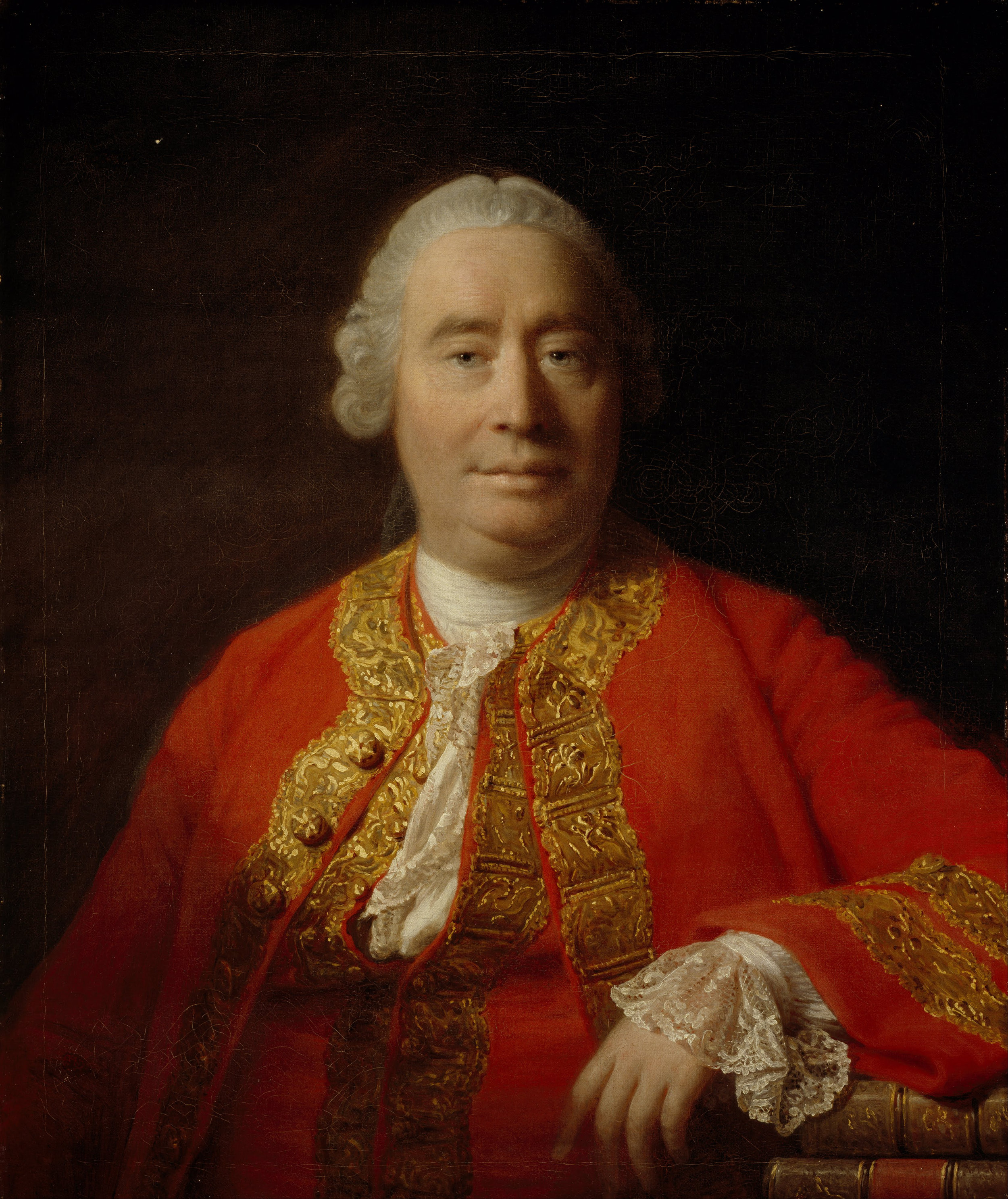 The great 18th century Scottish philosopher David Hume made some very effective arguments against the possibility of the miraculous, and his critique effectively kept generations of free-thinking Westerners from accepting the miraculous. But, although much of Hume's work has held up well, his argument against miracles has been discredited by modern philosophers. For example, the philosopher John Earman even wrote a book called?Hume's Abject Failure: the Argument Against Miracles.There are many reasons not to believe in a particular miracle, or even in all miracles, but categorically declaring that the miraculous?cannot?happen goes too far. Blind FaithMany religious people have gone in another direction. Admitting rationally that miracles don't happen--accepting the Enlightenment bias against the miraculous--they have white-knuckled-forced themselves to believe. Along this route, faith is what you are supposed to believe even though you know the things you are supposed to believe are impossible. This version of blind faith is dangerous and is one reason many people raised in rigidly fundamentalist churches and homes often completely reject their faith when they leave home: they encounter intelligent arguments against what they previously held in blind faith, and, at a loss, everything they once believed unravels. SummaryWe can't categorically reject miracles, and we also shouldn't accept some version of faith that is completely irrational and unthinking. When it comes to the question, "Can science and faith be reconciled," we need another option....
The great 18th century Scottish philosopher David Hume made some very effective arguments against the possibility of the miraculous, and his critique effectively kept generations of free-thinking Westerners from accepting the miraculous. But, although much of Hume's work has held up well, his argument against miracles has been discredited by modern philosophers. For example, the philosopher John Earman even wrote a book called?Hume's Abject Failure: the Argument Against Miracles.There are many reasons not to believe in a particular miracle, or even in all miracles, but categorically declaring that the miraculous?cannot?happen goes too far. Blind FaithMany religious people have gone in another direction. Admitting rationally that miracles don't happen--accepting the Enlightenment bias against the miraculous--they have white-knuckled-forced themselves to believe. Along this route, faith is what you are supposed to believe even though you know the things you are supposed to believe are impossible. This version of blind faith is dangerous and is one reason many people raised in rigidly fundamentalist churches and homes often completely reject their faith when they leave home: they encounter intelligent arguments against what they previously held in blind faith, and, at a loss, everything they once believed unravels. SummaryWe can't categorically reject miracles, and we also shouldn't accept some version of faith that is completely irrational and unthinking. When it comes to the question, "Can science and faith be reconciled," we need another option....
Can Science and Faith be Reconciled? [part 1 of 3]
I've been interested recently in some of the questions that 21st century Americans have about the Christian faith. One question that comes up frequently is, "Can science and faith be reconciled?"In researching this question, I've discovered three main answers.Option 1:No, because science and faith are and have been at war.This option is widely-held among modern people. But there is one problem with it: it is historically false.Without the Church, No Science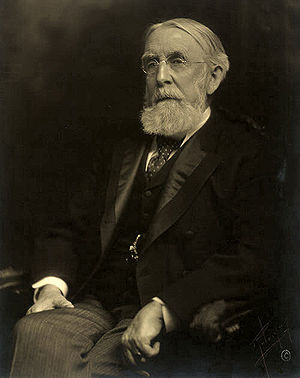 Andrew Dickson White?(1832-1918) was one of the co-founders of Cornell University. In 1896 he published a 2 volume work called?A History of the Warfare of Science with Theology in Christendom,?which put forward the idea that the Christian faith was responsible for interfering and holding back scientific achievement. White's work was extremely influential in the first part of the 20th century, and his argument did much to convince many that faith and science were at war, despite the obvious problems with his argument.The first problem with claiming that science and faith are at war is that, as many historians now argue, the culture of Christianity was directly responsible for the development of science in the West. Christians believe in a rational God who created the universe according to rational principles, a belief that is necessary to science. Rather than being antagonistic to science, the Christian faith allowed it to flourish. The greatest universities of the first 17 centuries of the last 2 millennia were virtually all developed by the Church to be places where faith could seek understanding, and most of the greatest scientific minds up until the Enlightenment were devout Christians.Second, A.D. White had an obvious bias against orthodox Christianity. For some reason, modern people, so quick (and rightly so) to be skeptical of many authoritative claims accept as gospel the claims of those who are obviously biased against the Church; many of us accept those arguments unthinkingly. In a culture that values science (as ours does), you can greatly undermine the faith by claiming the Church is anti-science, and A.D. White and many people have successfully done so. It says a lot about our modern anti-Church bias that we are eager to embrace any arguments that make the Church look badly. But What About Galileo?"That sounds great," some readers are thinking, "but what about Galileo?"
Andrew Dickson White?(1832-1918) was one of the co-founders of Cornell University. In 1896 he published a 2 volume work called?A History of the Warfare of Science with Theology in Christendom,?which put forward the idea that the Christian faith was responsible for interfering and holding back scientific achievement. White's work was extremely influential in the first part of the 20th century, and his argument did much to convince many that faith and science were at war, despite the obvious problems with his argument.The first problem with claiming that science and faith are at war is that, as many historians now argue, the culture of Christianity was directly responsible for the development of science in the West. Christians believe in a rational God who created the universe according to rational principles, a belief that is necessary to science. Rather than being antagonistic to science, the Christian faith allowed it to flourish. The greatest universities of the first 17 centuries of the last 2 millennia were virtually all developed by the Church to be places where faith could seek understanding, and most of the greatest scientific minds up until the Enlightenment were devout Christians.Second, A.D. White had an obvious bias against orthodox Christianity. For some reason, modern people, so quick (and rightly so) to be skeptical of many authoritative claims accept as gospel the claims of those who are obviously biased against the Church; many of us accept those arguments unthinkingly. In a culture that values science (as ours does), you can greatly undermine the faith by claiming the Church is anti-science, and A.D. White and many people have successfully done so. It says a lot about our modern anti-Church bias that we are eager to embrace any arguments that make the Church look badly. But What About Galileo?"That sounds great," some readers are thinking, "but what about Galileo?" The Galileo episode is not one that makes the Church look very good and I wish the Church had been wiser. However, I've learned some interesting facts about Galileo.First, the episode was less about science versus faith but more (in David Bentley Hart's phrase) about what happens when two men of "titanic egos" clash. The two men were Galileo Galilei and Pope Urban VIII. They had once been friends, but Galileo had deliberately insulted the Pope and his holiness was miffed. The whole sorry affair was, in some ways, a big personality conflict.Second, the Galileo episode took place within the context of the Protestant Reformation and the Roman catholic Counter-Reformation. It was a climate in which Rome was eager to maintain whatever control it could. Provoked by Galileo, Rome wanted to be sure that the arrogant scientist knew his place.The facts above don't explain away the church's foolishness in the Galileo episode, but they do help show it's not quite as bad as the pop culture version of the story goes. Plus, when speaking of Christianity, it's important for us to have a little humility and remember that the Church has been in existence for 2,000 years. Yes, there have been times in the last 2,000 years when Christians have seemed to be deliberately anti-intellectual and reactionary, but those times are, by far, the exceptions rather than the norm.ConclusionPut simply, Option 1 doesn't work because it's historically false: the Church is not and has never been at war with Science.To be continued in Part 2....
The Galileo episode is not one that makes the Church look very good and I wish the Church had been wiser. However, I've learned some interesting facts about Galileo.First, the episode was less about science versus faith but more (in David Bentley Hart's phrase) about what happens when two men of "titanic egos" clash. The two men were Galileo Galilei and Pope Urban VIII. They had once been friends, but Galileo had deliberately insulted the Pope and his holiness was miffed. The whole sorry affair was, in some ways, a big personality conflict.Second, the Galileo episode took place within the context of the Protestant Reformation and the Roman catholic Counter-Reformation. It was a climate in which Rome was eager to maintain whatever control it could. Provoked by Galileo, Rome wanted to be sure that the arrogant scientist knew his place.The facts above don't explain away the church's foolishness in the Galileo episode, but they do help show it's not quite as bad as the pop culture version of the story goes. Plus, when speaking of Christianity, it's important for us to have a little humility and remember that the Church has been in existence for 2,000 years. Yes, there have been times in the last 2,000 years when Christians have seemed to be deliberately anti-intellectual and reactionary, but those times are, by far, the exceptions rather than the norm.ConclusionPut simply, Option 1 doesn't work because it's historically false: the Church is not and has never been at war with Science.To be continued in Part 2....






![Are Miracles Possible? [Science & Faith, part 2 of 3]](https://images.squarespace-cdn.com/content/v1/5d70f59aefca59000162e4e6/1568657674041-KKAMA1U4NWETNGFV6AIP/image-asset.jpeg)

![Can Science and Faith be Reconciled? [part 1 of 3]](https://images.squarespace-cdn.com/content/v1/5d70f59aefca59000162e4e6/1568657672957-TN7837AT19XACFX53KU2/image-asset.jpeg)
